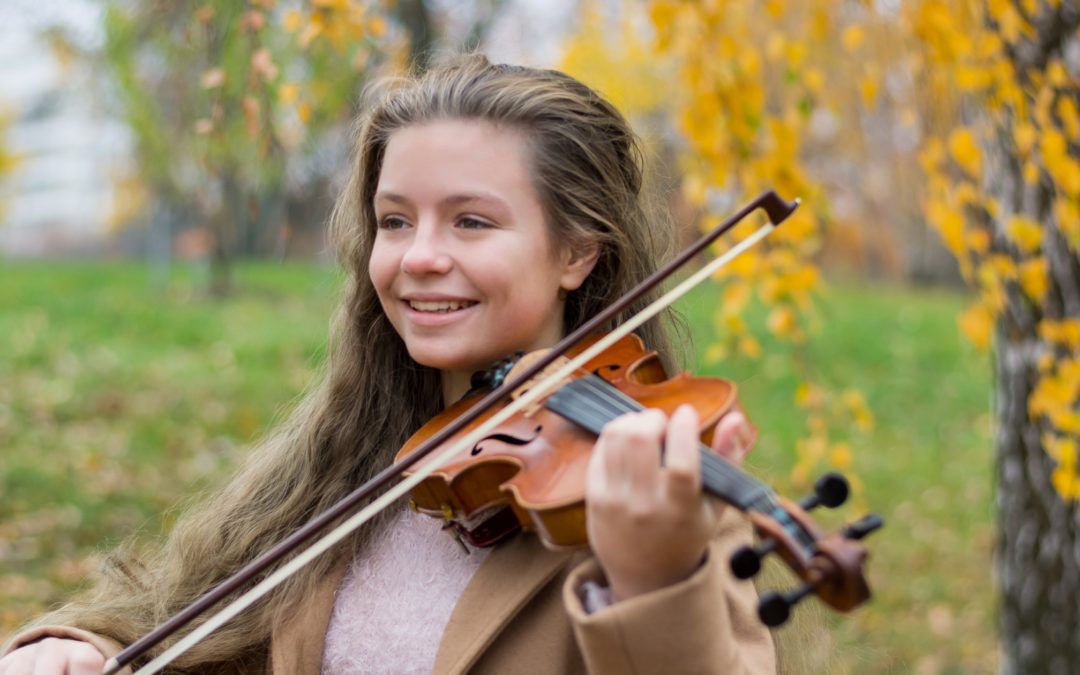A Homeschool Classical Music Playlist for Children
Editor’s Note: A clickable Spotify playlist is included at the end of this article.
The other day, my 14-year-old daughter Felicity was curled up on her bed with a sketchbook, drawing intently. After about half an hour of attentive sketching, I got curious and asked her if I could see what she was working on. She flipped the sketchbook around, and to my surprise, it was a portrait I immediately recognized as the famous composer Johann Sebastian Bach. “Wow, what inspired you to draw Bach?” I asked.
“I just really like Bach,” she replied. “I also did this one—” she flipped a few pages back and showed me an equally superb sketch she’d done of Mozart.
With a little more prodding, I discovered that Felicity had been nurturing an interest in classical music that she had been keeping to herself. “Bach is so awesome,” she gushed, as we discussed it.
Children and Classical Music
When I was a new parent, the Baby Einstein company produced a series of videos aimed at stimulating children’s cognitive development through exposure to music, art, and poetry, set against a backdrop of colorful visual aids. They had a video, for example, that would play simplified versions of Mozart songs while toy trains or colorful Rube Goldberg machines whirred along in the background. The Baby Einstein videos tapped into an important but often overlooked aspect of child development—exposure to beautiful sounds and colors is just as important as exposure to ABCs and 123s.
There are many benefits to listening to classical music. Classical music has been linked to enhanced spatial-temporal reasoning, which helps with problem-solving and understanding patterns, often referred to as the “Mozart Effect” (Schallenberg et al., 2007). For children, regular engagement with classical music has been linked to improved memory, attention, and language development, as the complex structures in music stimulate neural pathways in the brain. A 2013 study published in Frontiers in Psychology found that music training, including listening to classical music, can enhance verbal intelligence and executive function in young children (Degé, F., & Schwarzer, G., 2013).
A Classical Music Playlist for Children
When so many kids these days are listening to K-pop and Disney soundtracks, why not liven up their playlists by introducing classical music? Besides the cognitive benefits, classical music exposes them to a rich world of culture and history, connecting them with the vast musical tradition of the West.
But the world of classical music is so vast; where to begin? No worries! I have compiled a list of classical pieces below to get you started. I have organized this list alphabetically by composer with hyperlinks for review.
Bach, Johann Sebastian (1685-1750)
Eight Short Preludes and Fugues
Where Sheep May Safely Graze
Sleepers Awake
Jesu, Joy of Man’s Desiring
Goldberg Variations
Beethoven, Ludwig von (1770-1827)
1st Symphony
3rd Symphony
5th Symphony
9th Symphony
Für Elise
Coriolan Overture
Chopin, Frederic (1810-1849)
Nocturnes Op. 9
24 Preludes
Etudes, Op. 10
Piano Concerto No. 1 Em
Dvorak, Antonin (1841-1904)
9th Symphony
Prokofiev, Sergei (1891-1953)
Peter and the Wolf
Dance of the Knights
Handel, Georg Frederic (1685-1759)
Water Music
Liszt, Franz (1811-1886)
Liebestraum No. 3
Hungarian Rhapsody No. 2
Mozart, Wolfgang Amadeus (1756-1791)
Eine Kleine Nachtmusik
Lacrimosa
Turkish March (Piano Sonata in A)
Piano Concerto No. 23 in A, K. 488
Symphony 25 in Gm
Muggorsky, Modest (1839-1881)
Pictures at an Exhibition
Rimsky-Korsakov, Nikolai (1844-1908)
Flight of the Bumblebee
Saint-Saëns, Camille
The Carnival of the Animals
Danse Macabre
Strauss, Richard (1864-1949)
The Blue Danube Waltz
Tchaikovsky, Pyotr Ilyich (1840-1893)
The Nutcracker Suite
Valse Sentimentale
Swan Lake
Vivaldi, Antonio (1678-1741)
Four Seasons
Wagner, Richard (1813-1883)
Ride of the Valkyries
Tannhäuser Overture
Williams, Vaughan Ralph (1852-1958)
Fantasia on a Theme by Thomas Tallis
Further Resources and Playlists
If you’d like something a little more deliberately pedagogical, there are two 20th-century works created specifically for teaching children about classical music. One is Benjamin Britten’s 1945 composition The Young Person’s Guide to the Orchestra. Op. 34, which is structured as a way of showing off the tone colours and capacities of the various sections of the orchestra. Alternatively, you could check out episodes of Leonard Bernstein’s classic television series, The Young Person’s Guide to the Orchestra, which aired from 1958 to 1972. Created by Bernstein, the series aimed to introduce middle school-aged children to European classical music and the various orchestral instruments. All episodes of Bernstein’s show are available for free on YouTube.
I have also compiled all the songs listed above into a Spotify playlist called “Classical Music Playlist for Homeschooled Children,” which features over 23 hours of classical music. Please note that Spotify treats each movement within a piece as a separate track. So, for example, Chopin’s “24 Preludes” consists of twenty-four different tracks, and Beethoven’s “Symphony No. 9” is comprised of five separate tracks.
Classical music offers a joyful and enriching world for children to explore. With its beauty, complexity, and emotional depth, it has the power to inspire wonder, and maybe even a few spontaneous portraits of Bach. Indeed, start listening today, and let the music do the rest. To go deeper into the subject, make sure to check out Homeschool Connections’ online music appreciation courses today.
Want to connect with other homeschoolers? Join us in the Homeschool Connections Facebook Group or in the HSC Community. I’d love to continue this conversation with you there.






